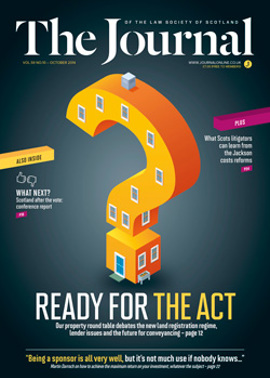LBTT: aligning payment and registration

First, I want to thank the Law Society of Scotland for its constructive engagement with my colleagues and me on these matters. This has helped us to reach a position that reflects the realities of conveyancing and provides an effective structure to collect the tax.
When Land and Buildings Transaction Tax (LBTT) comes into force on 1 April 2015, it will have much in common with its predecessor, Stamp Duty Land Tax (SDLT). But the Scottish Ministers were keen to associate the return and payment of the tax, and registration of title, more closely. This was to make the tax more efficient and easier to collect. So, the LBTT(S) Act 2013 requires payment of tax to be made at the same time as the return is submitted and before an application for registration is made. But, to smooth the process, it also provides that tax is treated as paid if “arrangements satisfactory” to Revenue Scotland are made for payment of the tax.
LBTT returns: electronic and paper
The payments in question are those associated with a return. We will provide an online portal for electronic returns. We think this will be the easiest and most efficient medium, for taxpayers, agents and Revenue Scotland. It is also in line with Scottish Government policy, as set out in Scotland’s Digital Future. We want to encourage everyone making LBTT returns to do so online. But we also recognise that some are not yet in a position to make online returns, so we will make provision for a paper alternative. That said, it should be no surprise that greater flexibility, and the full range of payment options, are available only to those transacting online.
Payment types
Those submitting returns through the Revenue Scotland portal will be able to make payment by direct debit, BACS, CHAPS, credit card, debit card, or cheque. When an electronic return passes validation, a unique reference will be generated, which will be used to ensure the payment is associated with the right return.
Electronic return payment options
Credit or debit card payments must be made at the time the return is submitted, using the portal.
When a form of electronic payment (direct debit, BACS or CHAPS) is selected, the payment date (for direct debit) or latest payment date (for BACS and CHAPS) must be shown on the return. We expect that this will be calculated by the online system (on the basis of the criteria below) and automatically filled in on the return. That date must be:
- the fifth working day after the effective date, if the return is submitted before the effective date, or otherwise:
- the earlier of the fifth working day after the submission date, and the last working day which is, or precedes, the 30th calendar day after the effective date.
A working day is a weekday (Monday to Friday) other than a bank holiday.
For direct debit payments, Revenue Scotland will initiate the transaction on the payment date on the return. For BACS and CHAPS, the taxpayer or agent must initiate the transaction by the latest payment date on the return.
Where cheque payment is selected on an electronic return, the cheque for the tax amount must be sent, quoting the reference number, so as to arrive at the appropriate address by the third working day after the date of submission.
Paper returns with cheques
Those making a paper return will need to send it with the cheque for the tax amount to the appropriate address. The return will be processed, and the cheque processed and banked, on the day of receipt. Cheque will be the only payment option for paper returns.
Impact of amendments to returns
We understand that the details of transactions may change after a return has been submitted. We will allow amendments to be made to facilitate this, but we have to balance this with protecting the revenue and encouraging good practice. So, when arrangements satisfactory are in process, any change to the effective date will not change the payment date (or latest payment date). The original date must be honoured. If a transaction falls through, or is subject to such significant change that arrangements satisfactory cannot be honoured, the return must be cancelled (technically, amended to zero) and (if appropriate) a replacement return submitted.
Arrangements satisfactory in practice
The discretion that Ministers have given Revenue Scotland to allow for arrangements satisfactory is an important one, and this places on us the responsibility to exercise it carefully and fairly. We understand the potential for mistakes on both sides, particularly in the early stages of operation. We will seek to work with taxpayers and their agents to get things right first time and, if things do go wrong, to put them right quickly and painlessly.
In this issue
- Respect revived
- Adoption: when should contact continue?
- Family values
- Designs on IP law
- Section 29 claims, time bar and service
- Sharing the rewards
- Reading for pleasure
- Opinion: Lauren Wood
- Book reviews
- Profile
- President's column
- Making the big changeover
- People on the move
- Another leap forward
- LBTT: aligning payment and registration
- The (legal) people have spoken
- Powers of attorney: another angle
- Greatness begins with a pin badge
- Jackson: has it delivered?
- The test for causing alarm
- When do licensed premises "cease to be used"?
- Empowering communities
- Has clawback lost its tax bite?
- Scottish Solicitors Discipline Tribunal
- Property Law Committee Update
- Call it a comeback
- Refereeing the referendum
- Law reform roundup
- From the Brussels office
- What's next for SYLA?
- Mediation first
- When life begins at 60
- With growth there is risk? (2)
- Ask Ash
- Sustainable future: new ideas for the training contract
- Mentoring - why?
- Lender Exchange: what's it about?
- A bar removed






